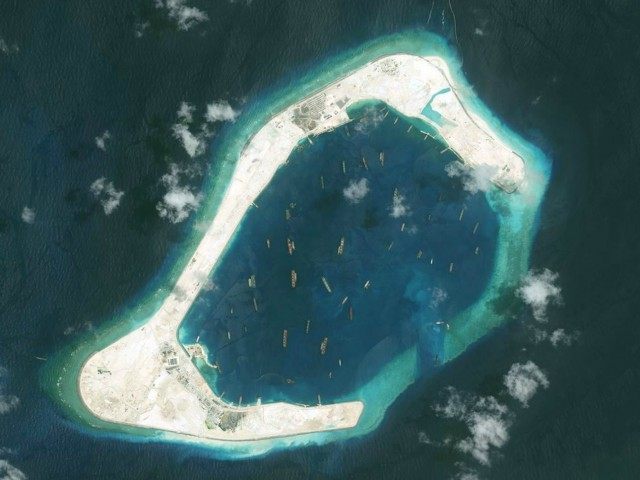In response to China’s assertive moves in the South China Sea, the U.S. State Department struck a deal with the government of the Philippines to permit American military forces to operate from five Philippine bases. The Chinese seem more annoyed than intimidated by the increased American military presence in the region.
The Washington Post reports that the Enhanced Defense Cooperation Agreement will allow U.S. forces to use portions of Antonio Bautista Air Base, Basa Air Base, Fort Magsaysay, Lumbia Air Base, and Mactan-Benito Ebuen Air Base. The Antonio Batista base is of particular significance, as it’s located only a few dozen miles from the disputed Spratly Islands — the epicenter of mounting tensions between China and the United States.
The State Department somehow managed to claim this agreement has nothing to do with China’s misbehavior in the South China Sea, while simultaneously implying it was totally about China, and they had better watch their step from here on out. As the Post reported:
State Department spokesman John Kirby, a retired two-star Navy admiral, said that the United States has “made absolutely no bones about the fact that we take the rebalance to the Asia Pacific region very seriously.” But he added that there is “nothing offensive or provocative” about any of the Pentagon’s deployment of troops to the region.
“It’s not about selling it to the Chinese or to anybody,” Kirby said, under questioning during a media briefing. “It’s about meeting our security commitments in a serious alliance with the Philippines. That’s what this is about.”
As to whether China got the message the State Department is not sending, their reaction could best be described as mild annoyance.
“The U.S.-Philippines cooperation should not target third parties, harm the sovereignty or security interests of other states or hamper regional peace and stability,” said a spokesperson for the Chinese Foreign Ministry. “The U.S. has talked about militarization in the South China Sea. But can it explain whether its own increased military deployment in the region is equivalent to militarization?”
Of course, China does not think its own military buildup is provocative because it supposedly has ancient ancestral claims to the entire South China Sea. As an editorial at China’s state-run Xinhua news agency put it, “China holds indisputable sovereignty over the South China Sea islands and its adjacent waters. The Philippine islands were not an independent country when China conducted its maritime demarcation after World War II.”
The editorial goes on to dismiss international arbitration claims as a ruse to cheat China out of its historic territorial rights, and accuse the U.S. and Philippine governments of trying to stir up trouble in the region.
“With its military provocation in the South China Sea, the United States is essentially building on its presence in the Asia-Pacific. By collaborating to confront China politically and militarily, the United States and its allies may be thinking that they can undermine the external environment of China and slow down its peaceful development,” Xinhua asserts.
China is currently accusing Filipino fishermen of throwing firebombs at its “law enforcement vessels,” while the fishermen say the Chinese have been driving their trawlers away from traditional fishing grounds, pelting them with bottles when they did not move quickly enough.
The U.S. Navy reports signs that China may be preparing more construction in the shoals it has taken from the Philippines, and worries China may grow even more aggressive if it loses an arbitration case with the Philippines at the Hague this summer — the same sort of arbitration Xinhua denounced as a scam to deprive China of its territorial rights.
The Philippines are also embroiled in an arbitration battle with Taiwan, over a South China Sea island called Taiping. Taiwan has been showing reporters around the island to demonstrate that it has developed its real estate into a productive home for Taiwanese citizens, while the Philippines wish to have Taiping designated a mere “rock” incapable of sustaining human habitation, thereby preserving an exclusive economic zone for its own nearby island of Palawan. That is the same island Antonio Bautista Air Base is located upon.
As the Associated Press observes, the Taiping clash between the otherwise friendly Taiwan and Philippines is also part of the pushback against China’s claims to own virtually the entire South China Sea region. Much as China has been chasing Filipino fishermen away from shoals it claims, the Taiwanese garrison on Taiping periodically disperses Chinese and Vietnamese fishing fleets that approach waters it claims.
The Hague’s decision on Taiwan’s claim to Taiping will almost certainly have legal repercussions for China’s claims to other disputed islands. The AP points out that some of the artificial islands China has been building in high-tension areas are already larger and more developed than Taiping.
Chinese control of the South China Sea could put some $5 trillion in annual shipping at risk. It could also be an existential crisis for Taiwan and maybe even the Philippines. The U.S. has, at least, put down a marker on the Philippines by establishing a presence at its military bases. China is still waiting to see if that opening move will develop into a more serious challenge.

COMMENTS
Please let us know if you're having issues with commenting.